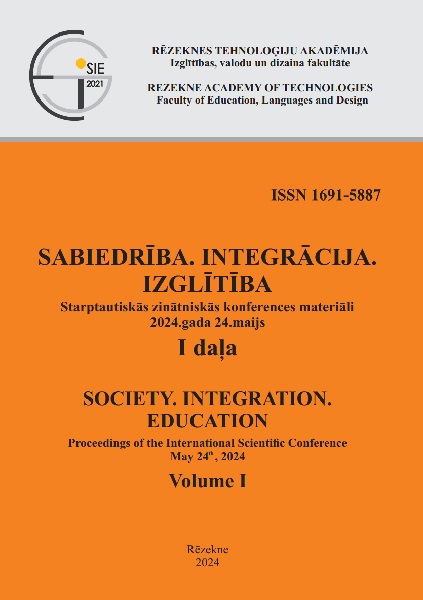INDIVIDUAL LEARNING PLAN OF A SECONDARY SCHOOL STUDENT: THE BASIS FOR DESIGNING PROFILED EDUCATION AND A CONSCIOUS CHOICE OF PROFESSION
DOI:
https://doi.org/10.17770/sie2024vol1.7863Keywords:
basic general education subjects, individual learning plan, profiling subjectsAbstract
In the 21st century, the search for a new educational paradigm is characteristic of all countries of the European Union. The predominance of the traditional information approach, which is mainly focused on the transfer of knowledge to learners, creates a passive person (Thoresen, 2007). Profiled education represents a new model of the system of education with a student as a subject of the educational process in its center. Within this model, the educational process is organized in accordance with learner’s interests, abilities, and capabilities, i.e., it has a natural character. The key quality of a student within profiled education is his/her subjectness. This quality is formed under the conditions of student’s active, conscious position in the educational process (Čehlovs, 2011). An individual learning plan developed by the student together with the teacher becomes the basis for designing profiled education, which contributes to a conscious choice of profession. The subject of research is the individual learning plan of a senior secondary school student as the basis for designing the content of profiled education and for the conscious choice of profession. The aim of the study is to consider the structure of student’s individual learning plan and to determine its role in the design of profiled education and in the choice of profession. The research methods include theoretical analysis, observation, and survey. As a result of the research, the structure and content of the individual learning plan of a senior secondary school student were determined, and the analysis of the role of the individual learning plan in the design of profiled education and in the conscious choice of profession was carried out.
References
Alijevs, R. (2021). No zināšanām uz radošu domāšanu [From knowledge to creative thinking]. Mūsdienu izglītības pamatprincipi [Fundamental principles of contemporary education]. Tagad [Today], 12, 116-121. Rīga: Latviešu valodas aģentūra.
Aliyev, R., Chekhlov, M., Chehlova, Z., & Kevisa, I. (2022). Social self-determination of a secondary school student in the context of humanization of the educational process. SOCIETY. INTEGRATION. EDUCATION. Proceedings of the International Scientific Conference, (1), 306-315. doi: https://doi.org/10.17770/sie2022vol1.6852
Čehlova, Z., Čehlovs, M. (2010). Skolotāja pedagoģiskās kompetences teorētiskie pamati [The theoretical basis of the development of teacher’s pedagogical competence]. Latvijas Universitātes raksti [Research Papers of the University of Latvia]. Pedagoģija un skolotāja izglītība [Pedagogy and Teacher Education]. Rīga: LU, 57-63.
Čehlovs, M. (2011). Vidusskolēnu pašnoteikšanās attīstības humanitārie aspekti [The humanitarian aspects of the self-determination of secondary school students]. Rīga: RAKA.
Chehlovs, M., Chehlova, Z., (2015). The development of the professional self-determination of senior secondary school students in the process of specialized education. SOCIETY. INTEGRATION. EDUCATION. Proceedings of the International Scientific Conference May 22nd-23rd, 2015, (2). Rēzekne: Rēzeknes augstskola, 19-26. https://doi.org/10.17770/sie2015vol2.456
Comenius, J.A. (1907). The Great Didactic. London: Adam and Charles Black. Retrieved from: https://ia601305.us.archive.org/7/items/cu31924031053709/cu31924031053709.pdf
Dautova, O., (2006). Samoopredelenie lichnosti shkolnika v profilnom obuchenii [Self-determination of student’s personality in profiled education]. SPB: КАРO.
OECD. (2018). The Future of Education and Skills. Education 2030. Position Paper. https://www.oecd.org/education/2030-project/
Ross, A., (2006). Citizenship Education: Europe and the world. London: CiCe.
Solberg, V.S., Phelps, L., Haakenson, K., Durham, J., Timmons, J. (2012). The Nature and Use of Individualized Learning Plans as a Promising Career Intervention Strategy. Journal of Career Development (39)6. 500-514.
Thoresen, V. (2007). Building Bridges. Hedmark: University College.
Thoresen, V. (2017). How transformational learning promotes caring, consultation, and creativity, and ultimately contributes to sustainable development: Lessons from the Partnership for Education and Research about Responsible Living (PERL) network. International Review of Education (63)6. 915-934. Springer Science. Retrieved from: https://www.jstor.org/stable/44979986 Vygotsky, L., (1984). Detskaya psihologiya [Child psychology]. Moskva: Pedagogika.






